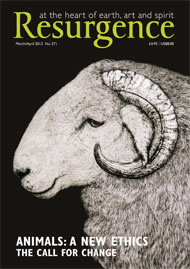Dominion is compellingly written. I first read it in hardcover eight years ago, shortly after it first came out. When I was asked to review the recent paperback edition, I thought I would refresh my memory a bit before writing a few words. But after starting to read it, I was drawn in and read the entire book, again, from cover to cover.
Other books have taken on the vast subject of human control over animals. What makes Matthew Scully’s Dominion different is that the author takes us right into the heart of the beast, both in theory and in practice, by talking to the people who are most directly involved in the human domination of animals.
Early in the book, Scully plunges into a brilliant discussion of trophy hunting. We visit the annual convention of Safari Club International, where prominent conservatives all deliver their defences of hunting. Scully himself is a conservative, a former editor of National Review, and a former speechwriter for George W. Bush. He talks to the outfitters, to the hunters themselves, to their wives, and even briefly to the movie star Bo Derek before she is hurried off by her escort.
Scully is not content to produce a catalogue of horror stories or statistics about disappearing elephants. He shows us the mechanics of trophy hunting through conversations with the people who are actually doing it. He uses the same method when he goes to the annual meeting of the International Whaling Commission and talks directly to the whalers themselves, and to the Japanese who are defending their country’s continued slaughter of whales (supposedly for scientific ‘research’).
Lest whaling and trophy hunting seem like easy targets, he also goes to a pig factory farm in North Carolina. Here he gives us what is one of the best-ever descriptions of how a factory farm actually works – clear, concise, and clinical. His account of the humans involved is just as telling as his description of the pigs themselves: from Roberto, the labourer who does not speak a word of English, to Gay, a hefty woman in her late 20s with a doctorate, all the way to the owner of the place (who declares, that they – the pigs – love it!). Upon being shown around, Scully discovers that the misery of the pigs is universal. They are constantly and narrowly confined. Everywhere the smell of filth. Everywhere the sight of broken bones, tumours, sores, ulcers, pus, blood, bruises – and torn ears.
Some people, especially left-leaning types like myself, might be a bit suspicious of Scully’s conservative credentials. You can relax: this book won’t sully any of your liberal ideals. Compassion does not have any single political party. Only a few references hint at political ideology. And shouldn’t conservatism mean conserving something basic, like human decency? Moreover, it appears that Scully’s conservative credentials played a large part in his getting all these great interviews. In many important respects, this is a book only a conservative could have written.
In addition, Scully discusses religion and the Bible, whether animals can think, and the views of modern philosophers. At the end he makes some practical suggestions for reform. Some of those already sympathetic to his cause may feel that the discussion drags a bit, but I appreciate Scully’s determination to be thorough. He shows that there is a single pattern of rationalisation that pervades all the various forms of animal abuse, including factory farming. To each justification, Scully simply exposes the reality behind the words thrown up to obscure it.
This book asks over and over again: Is this part of the natural order? Is this what the Bible is really talking about? Is this what you mean by dominion?






